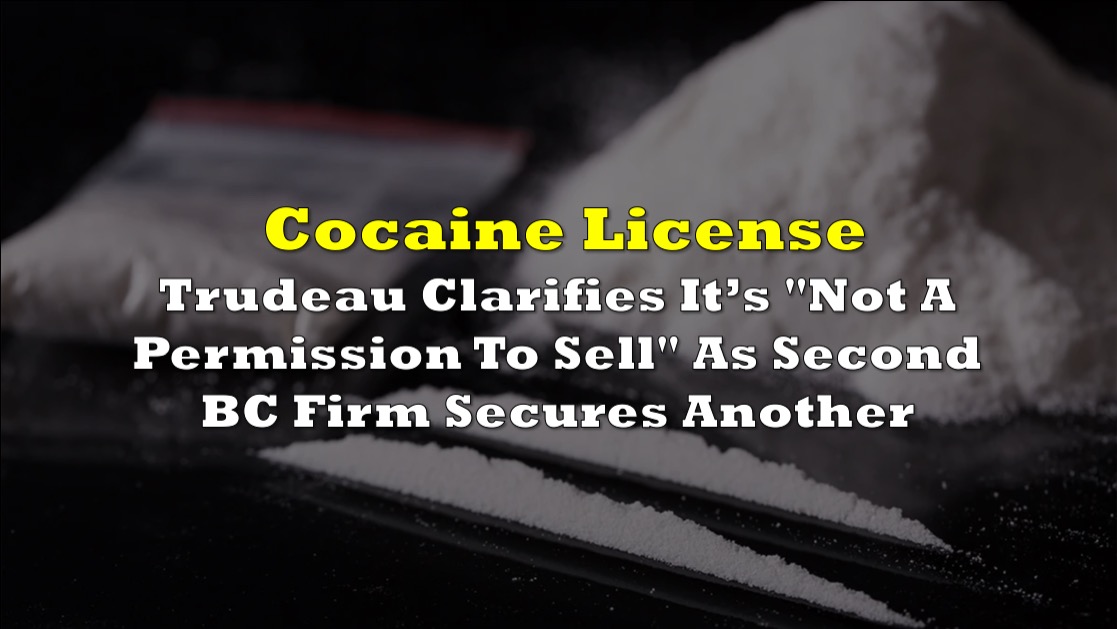Langley-based Adastra Holdings (CSE: XTRX) has walked back its original statement regarding its announcement of amended Controlled Drug and Substances Dealer’s License granted by Health Canada.
In the original announcement on Feb. 22, CEO Michael Forbes stated that the company would “evaluate how the commercialization of this substance fits” with the firm’s business model. In the most recent statement, that reference was removed.
The cannabis firm also clarified in its recent statement that it is “not currently undertaking any activities with cocaine,” and its amended license does not permit the firm to sell cocaine to the general public, but rather only to “other licensed dealers who have cocaine listed on their licence including pharmacists, practitioners, hospitals, or the holder of a section 56(1) exemption for research purposes under the Controlled Drugs and Substances Act (CDSA).”
With the amended license, Adastra is now allowed to work with up to 250 grams of cocaine and import coca leaves in order to produce and synthesize the drug as well.
The amount is way higher than what is allowed for public use under the Section 56 exemption. British Columbia became the first province in Canada to decriminalize the personal use of heroin, meth, ecstasy, and cocaine–with explicit guidance that possession of up to 2.5 grams of said drugs will no longer be subject to criminal charges and the drugs will not be confiscated.
Hence, Adastra’s original announcement raised eyebrows and earned the ire of government officials. Both Prime Minister Justin Trudeau and British Columbia Premier David Eby were “astonished” with the cannabis firm’s statement.
“I understand that this company has indicated Health Canada has given them some kind of authorization. It is not part of our provincial plan,” the premier said. “If Heath Canada did in fact do this, they did it not only without engaging with the province, but they did it without notice to us.”
Meanwhile, Trudeau stated on Friday that he was “as surprised as” Eby by Adastra’s proposals. He stated that the government was “working very quickly” with Adastra to “correct the misunderstanding” produced by the company’s commercialization declaration.
“I was as surprised as the premier of British Columbia was to see that a company was talking about selling cocaine on the open market or commercializing it,” Trudeau said, adding that Adastra’s license was “not a permission to sell it commercially or to provide it on an open market.”
Federal Conservative Party leader Pierre Poilievre castigated the “Trudeau government,” commenting that getting a cocaine license was seemingly faster than getting a passport.
Meanwhile, the Trudeau government grants a permit to a corporation to make and sell cocaine.
— Pierre Poilievre (@PierrePoilievre) March 3, 2023
It took two months to get the license—faster than getting a passport!https://t.co/UwLCknItpD
Poilievre doubled down recently on this rhetoric, saying the New Democratic Party and Liberal coalition is legalizing the “drugs that are killing our people.”
Eby is the current leader of the British Columbia New Democratic Party.
Harjit is right. Woke is broke.
— Pierre Poilievre (@PierrePoilievre) March 3, 2023
The NDP-Liberal coalition is legalizing cocaine, heroin and fentanyl—the drugs that are killing our people.
More treatment and recovery—not more poison. https://t.co/ps5jgUJZzO
Health Canada also clarified that the firm could only sell cocaine to other license holders, reporting to Eby that Adastra may have “significantly misrepresented the nature of the licence” in an irresponsible manner.
“Health Canada has contacted the company to reiterate the very narrow parameters of their license,” the agency said regarding Adastra Labs. “If the strict requirements are not being followed, Health Canada will not hesitate to take action, which may include revoking the licence.”
Second cocaine license
Another BC company claims it is now licensed to produce, sell, and distribute cocaine, opium, and MDMA, also known as ecstasy.
Victoria-based Sunshine Earth Laboratories, a biosciences corporation based in Victoria that “aims to bring safer supply of drugs to the global market,” announced in a news release that it received an updated Controlled Drug and Substances Dealer’s License last year to include MDMA and cocaine.
The firm’s statement draws parallel rhetoric from Adastra’s original statement, where the latter said it would position itself “to support the demand for a safe supply of cocaine.” That was part of the removed line of how Adastra plans to evaluate “how the commercialization of this substance fits in with its business model at Adastra.”
But after what happened to Adastra, Sunshine Earth also published an amended statement on Friday, stating that the company is licensed to do activities with these restricted chemicals “under tight limitations imposed by Health Canada.”
When asked how many other companies have gotten similar license revisions, Health Canada stated that it does not share or publicize the list of companies that have acquired licenses, nor does it discuss the status of licensing amendment applications for safety, security, and privacy reasons.
According to Health Canada spokesman Mark Johnson, such license changes are “not new,” and “some companies have had this substance on their licence for 20-plus years.”
Information for this briefing was found via Market Screener and the sources mentioned. The author has no securities or affiliations related to this organization. Not a recommendation to buy or sell. Always do additional research and consult a professional before purchasing a security. The author holds no licenses.









